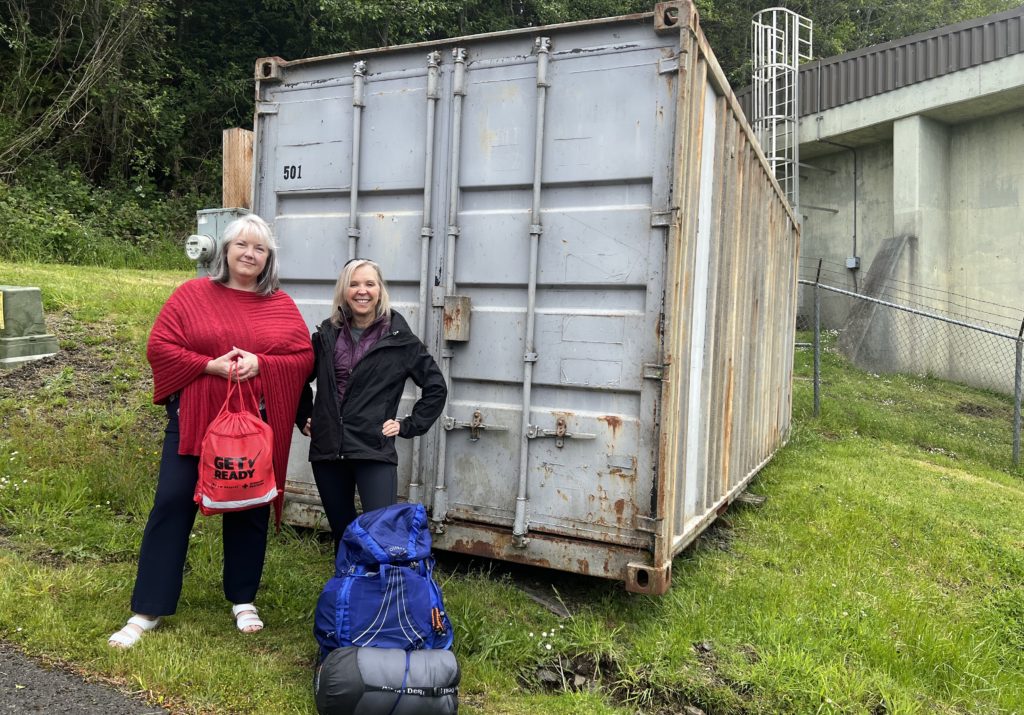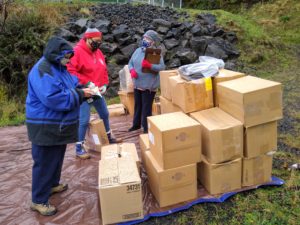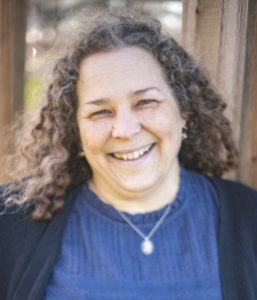
By CHERYL ROMANO/YahatsNews.com
YACHATS — Some members of Yachats’ Emergency Preparedness Committee are clashing with the city over how to best help people survive a tsunami. Frustrated by what they see as inaction, they’re circulating a petition to muster support for a proposal to increase the number of “caches” — big metal shipping containers holding emergency supplies.
However, City Manager Heide Lambert is calling for patience as City Hall, wracked by pandemic and staff tumult, struggles to bring order to the various projects that have been languishing for more than a year.
“The lack of action has been very frustrating to our committee,” says committee member Tracy Crews. “It’s a matter of survival, literally.”
That frustration led to the resignations this year of two other committee members — chair Tom Fisher, and Bob Bennett, who had served on the committee for decades.
In the aftermath, two members of the Public Works Commission – Linn West and Alex Cox — stepped in to join the committee. West is chair of the Public Works Commission and now also interim chair of the emergency committee.
The committee was set up in 2008 to advise the city on emergency preparedness and makes recommendations to the Public Works & Streets Commission, which in turn can forward, amend or kill any of its recommendations to the city council. It also assigns a member as a liaison to the Yachats Rural Fire Protection District board.
Committee member MaryBeth Selby and others have been circulating a petition addressed to the mayor and city council and calling for funding and a timeline to place a minimum of five caches throughout the city, including one at the Yachats fire station on the north edge of the city.

The city currently has two caches, also known as Conexes, perched high on hills overlooking the north and south sections of Yachats. These disaster relief caches contain food, water purification aids, medical supplies and body bags. Maintaining at least five caches in various locations would “allow for survivors of a Cascadia subduction zone tsunami disaster to survive the first several days post-disaster,” Selby’s petition states.
“Cascadia will happen; we just don’t know when,” said Selby.
The subduction zone is a 700-mile fault that runs along the sea floor of Pacific Coast states. It’s estimated to rupture on average every 200-500 years, according to the Federal Emergency Management Agency. The last major Cascadia earthquake and tsunami occurred in 1700, and experts have warned that the next rupture could be imminent. Depending on its magnitude, the earthquake and resulting tsunami could decimate much of the West Coast — including Oregon.
According to some committee members, attempts to take advantage of current and potential funding to add and replenish caches and to get a plan in front of the city council, have been thwarted by city hall inaction.
“We don’t want to lose momentum, or lose any more committee members,” says Crews.
“Critical to survival and recovery”
With the median age of Yachats residents in the mid-60s and the absence of a medical clinic or police in town, “We feel strongly that these caches are critical to survival and recovery,” Crews told YachatsNews.

The committee’s petition says it not feasible “to believe that our residents can run up a mountain,” carrying supplies.
Crews, Selby, Fisher and Bennett say city manager Heide Lambert has been the main impediment to the committee’s plans. The committee “has had difficulty making any progress” since Lambert became city manager in February, Crews said.
On Thursday, during a general city council discussion on what councilors felt good about this year, most said they were pleased with how Lambert has begun to re-tool the city’s project process — even if it meant frustration from various groups who proposed them and wanted more immediate action.
Crews said the city budget includes $10,000 each year to support the caches and she obtained a $5,000 grant from Lincoln County Emergency Management. Committee member Drew Roslund, managing partner of the Overleaf and Fireside motels, has budgeted $6,000 to help purchase emergency supplies for a publicly-provided container on or near the two motel properties.
“We are sure we could raise more if we just got the okay to move forward,” Crews said.
In May, the committee submitted a detailed cache proposal to the Public Works & Streets Commission and to Lambert. Public Works approved the plan in July.
However, the proposal “has languished for many months now and has not been brought to the city council for discussion or a vote,” said Crews.
City manager responds
Lambert said in an interview with YachatsNews that she understands “the frustrations of some of the committee members.”

But the coronavirus pandemic stretching back to mid-2019, two interim city managers and other staff turmoil before her hire in February stymied many proposed projects from city committee and commissions.
“They (some EPC members) wanted to move forward, and I wasn’t in a place where I could move forward,” she said.
Under a just completed capital improvement plan project process, Lambert says the city now has a way to consider projects that were on hold during the transition. Next month, she says she’s planning to bring all projects — including the emergency preparedness committee proposal — to the mayor and council.
Lambert is also contracting with Holly Hamilton, a former city planner in Waldport and Yachats, to help bring order to the city’s project process.
Lambert says that she and West “have worked really hard to see how to better address preparedness.”
One of those options could be a FEMA recommendation that calls for cities like Yachats to create a cache for administration only, focusing on emergency communications such as ham radios. Such a centralized cache would not be stocked with food and other supplies. Instead, residents would be urged to create their own “go bags” with enough food and water for three days. After that, survivors would need to scavenge homes for basic necessities.
She said FEMA advises that local municipalities put energy into recruiting and training members of a Community Emergency Response Team, a national grassroots program that exists in Yachats.
Two resignations
Nevertheless, the committee members who recently resigned are discouraged.
Fisher, who served on the committee for three years and was chair for two years, said the city’s relationship with FEMA is critical.
Grants and aid from the federal government in the event of earthquake, wildfire, flood or tsunami are “affected by our preparedness,” Fisher said. One of the requirements to be FEMA-certified as tsunami- or storm-ready and be eligible for grants and other emergency help, is an emergency operations procedure document that’s posted online on the city website. That document “has not been updated since I’ve been on the committee,” Fisher said.
“I was never able to get the mayor to update that document; the same thing is true of our city manager and the council,” he recalls. “After two years I got fed up.”
Bennett, who was committee chair for years, said the committee could not seem to find “any common ground with the city manager.” Bennett said he finally resigned because “I don’t really need the grief.”
Bennett contends it would be “foolish for us not to do at least something to try and prepare” for a Cascadia earthquake and resulting tsunami. “If not, we need to find out what’s preventing us moving forward, and find ways to get there.”
To read the Emergency Preparedness Committee’s cache proposal go here
- Cheryl Romano is a Yachats freelance reporter who contributes regularly to YachatsNews.com. She can be reached at Wordsell@gmail.com



There have been many people who contributed to the community and city of Yachats for years who, in the span of eight months, suddenly decided they needed to walk away because (1) they realized their progress working with the city on projects had completely stopped and (2) the city’s stonewalling communication style was severely negatively impacting their mental health.
These are not normal growing pains during a transition. This is not what leadership is supposed to look like.
The point where an open-minded, impartial person could dismiss it as a few disgruntled individuals who are dealing with their own problems was many months ago.
One can hope that at some point city leadership will start taking seriously the number of deeply caring people they’ve run off and reconsider their approach to communication and project management.